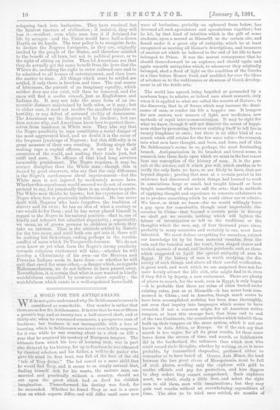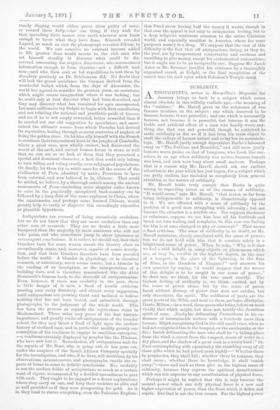A WORD FOR THE ANTIQUARIANS.
WE do not quite understand why Dr. Schliemann's career is considered so remarkable. Our wonder is rather that there are so few Dr, Schliemanns. It is true that he was at fifteen a grocer's boy, and at twenty.two a half-starved clerk, and at thirty-six, when be renounced commerce, a prosperous man of business ; but business is not incompatible with a love of learning, which in Schliemanu was never even held in suspense, for it was while he was running about as a clerk on £32 year that he acquired his mastery of European tongues. The ',ultimate form which his love of learning took, was in part Also dictated by his history, for up to fourteen he was educated by classical scholars, and his father, a well.to.do pastor who gave his mind its first bent, was full of the love of the old " tale of Troy divine." The lad vowed as a mere child that he would find Troy, and it seems to us simply natural that, finding himself rich for his wants, the mature man, un- married and practically without a country, should set ,out upon the quest which had so fired his childish imagination. Thenceforward his destiny was fixed, for he succeeded. Whether he found Troy or not is a ques- tion 011 which experts differ, and will differ until some new wave of barbarism, probably an upheaval from below, has drowned all such speculators and speculations together ; but he bit, by that kind of intuition which is the gift of some students, upon a mound at Hissarlik as the certain site, and found under it _a great city of antiquity, which he at least recognised as meeting all Homer's descriptions, and treasures of ancient art which he believed to the end of his life to have belonged to Priam. It was the merest consequence that he should thenceforward be an explorer, and should again and again. unearth antiquities which, to whomever they originally belonged, shed a flood of light on the condition of the Greeks at a time before Homer lived, and modified for ever the ideas of scholars as to the suddenness or slowness of Greek develop- ment in all the fictile arts.
The world has agreed, being beguiled or persuaded by a newborn hope, to admire, or indeed care about research, only when it is applied to what are called the secrets of,Nature ; to the discovery, that is, of forces which may increase the domi- nance of man, or render his life a happier one. It hungers for new motors, new sources of light, new medicines, new methods of rapid inter-communication. It may be right for what we know, though it will not discover the secret of happi- ness either by preventing fevers or enabling itself to tell lies in twenty kingdoms at once ; but there is an older kind of re. search which still retains for the few some value—the research into what men have thought, and been, and done, and of this Dr. Schliemann's seems to us, perhaps, the most fascinating branch. Antiquarianism in its broadest and truest sense, is research into those facts upon which we must in the last resort base our conception of the history of man. It is the pur- suit or the science, call it which you will, which enables us to verify the only facts we have, or are likely to have, that are beyond dispute ; proving that man at a certain period in his existence had discovered certain things, had learned to work in associations large or small, had taught himself or been taught something of what we call the arts; that is, methods of applying thought and experience to concrete substances so as to produce something which he could either use or admire. We know, or think we know—for we would willingly leave a gap open for conceivable, though most improbable, dis- coveries in China—that beyond a certain point in history we shall get no records, nothing which will lighten the labour of investigation or tell us the traditions or the thoughts which the men, say, of four thousand years since, probably in many countries and certainly in one, must have inherited. We must deduce everything for ourselves, extract our knowledge bit by bit from material remains, from the ruin and the tumulus and the tomb, from shaped stones and worked morsels of metal, and broken potsherds, such as those which suggested to Lyell the special antiquity of man in Egypt. If the history of man is worth studying, the dis- covery of such things, and above all their careful verification, is great work, and work which we are surprised does not far more keenly attract the idle rich, who might find in it, even if they did it by deputy, a new excitement. There are plenty of places to search, for the work, even in Egypt, is only begun —it is probable that there are ruins of cities buried under existing ruins, just as at Hissarlik—it has never been com- menced in China ; and in America, though much seems to have been accomplished, nothing has been done thoroughly, not even that inquiry into languages which seems to have revealed, if not a common origin for all American native tongues, at least this strange fact, that from end to end of the two Continents, the countless tribes which inhabit them built up their tongues on the same system, which is not one known in Asia, Africa, or Europe. Or if the rich say that search is too vague, for all its great results, let them come lower down the stream of time, and search, as Schliemann did in the borderland, the unknown time which men who could record their thoughts, whether by writing, or, as is more probable, by transmitted rhapsodies, professed either to remember or to have heard •of. Greece, Asia Minor, the land between the two great rivers of Mesopotamia, must be full of such places, needing only the explorer with gold to soothe officials and pay for protection, and hire diggers to obey orders they cannot comprehend. Such explorers must, we admit, study a little first, and select the right men to aid them, men with imaginations ; but they may gain vast results without an overwhelming expenditure of time. The sites to be tried once settled, six months of
steady digging would either prove them guilty of error, or reward them fully,—for one thing, if they wish for that, spreading their names over earth wherever men know enough to know what they have done. Nineveh revealed Layard, as much as ever the phonograph revealed Edison, to the world. We can conceive no external interest added to life greater than would accrue to the rich man who set himself steadily to discover what could be dis- covered concerning the origines Americante, who accumulated information enough to form theories—not a difficult task now—and who then sent or led expeditions to test them by discoNry precisely as Dr. Schliemann did. No doubt they will lack the grand assistance the German derived from the wonderful ballad which, from the days of Alexander, the world has agreed to consider its greatest poem, an assistance which might create imagination where it was lacking ; but he could only at best discover what had been described, and they may discover what has remained for ages unsuspected. Let some millionaire try Delphi to begin with, first conciliating and not iritating the national and justifiable pride of Greece, and see if he is not amply rewarded, better rewarded than if he carried out our old suggestion to speculators, and ascer- tained the ultimate source from which Paetolus had derived its reputation, lasting through so many centuries of neglect, of being the golden river. Or let him ally himself with the French to continue their intermittent hunt in the jungles of Cambodia, where a great race, now wholly extinct, had.. discovered the secret of the arch, and carved human forms in stone so well that we can see as we look at them that they possessed a special and dominant character, a look that could only belong to men ruling, and ruling cruelly, over subjugated populations. Or, finally, let them try to settle once for all the source of the civilisation of Peru, admitted by native Peruvians to have been external, and now believed to be Chinese. That could be settled, we believe, by a thorough search among the ancient monuments of Peru—including some singular ruins known to exist in the practically unexplored back-country—to be followed by a long 4isit of the same explorers to China, where the missionaries, and perhaps some learned Chinese, would greatly help to verify or disprove this exceedingly attractive or plausible hypothesis.
Antiquarians are accused of being excessively credulous, but we do not know that they are more credulous than any other men of research. They are no doubt a little more hampered than the majority by mere amateurs who will not take pains, and who sometimes jump in sheer ignorance at extravagant conclusions. It is rather, we should say, that their blunders have for some reason struck the literary class as exceptionally comic, and, moreover, capable of comic descrip- tion, and that their blunders therefore have been paraded before the world. A blunder in physiology, or in chemical research, or astronomy, never seems comic; but a blunder in the reading of an inscription, or the interpretation of a building does, and is therefore remembered like the Abbe Domenech's famous book, to the discredit of antiquarianism. Even, however, if there was credulity in the past, there is little danger of it now, a flood of hostile criticism pouring over every discovery, and almost every suggestion, until antiquarians are growing timid and inclined to believe nothing that has not been tested, and submitted, through photographs, to the judgment of the whole world. This has been the process as regards the mysterious ruins in Mash onaland. Those ruins may prove of the first historic importance, and greatly excite all antiquarians of the broader school, for they may throw a flood of light upon the earliest history of civilised man, and in .particular modify greatly our conception of his readiness to engage in maritime enterprise, —a readiness certainly displayed by peoples like the Hindoos, who have now lost it. Nevertheless, all antiquarians wait for the reports of Mr. Bent, who is going out, Or has gone out, under the auspices of the South African Company specially for the investigation, and who, if he lives, will doubtless, by his observations, measurements, and photographs, enable the ex- perts at home to come to definite conclusions. No; credulity is not the modern foible of antiquarians so much as a certain want of vigour, accompanied by a decided unreadiness to part with cash. They ought to be engaged in a dozen explorations where they carry on one, and keep their societies as alive and as well provided as if they were prospecting for gold. As it is, they tend to starve everything, even the Palestine Explora- tion Fund never having half the money it wants, though in that case the appeal is not only to antiquarian feeling, but to a 'deep religious sentiment common to the entire Christian world, and especially manifest in America, where for some purposes money is a drug. We suppose that the root of this difficulty is the fact that all antiquarians, loving, as they do, the past, are by temperament conservative and cautious and unwilling to give money, except for ecclesiastical restorations but it ought not to be an insuperable one. Suppose Mr. Jacob Astor or Mr. Brunner justifies his existence by a thoroughly organised search at Delphi, or the final completion of the search into the rock upon which Solomon's Temple stood.















































 Previous page
Previous page